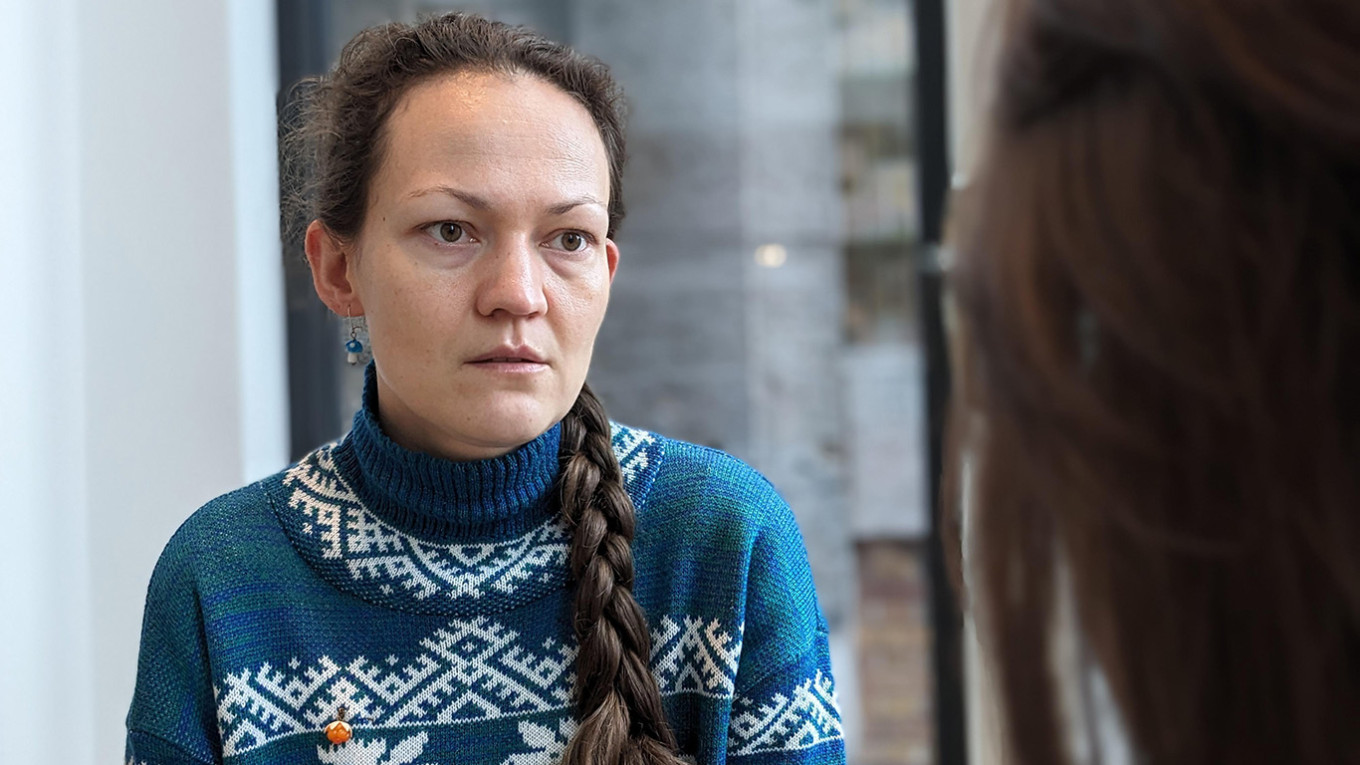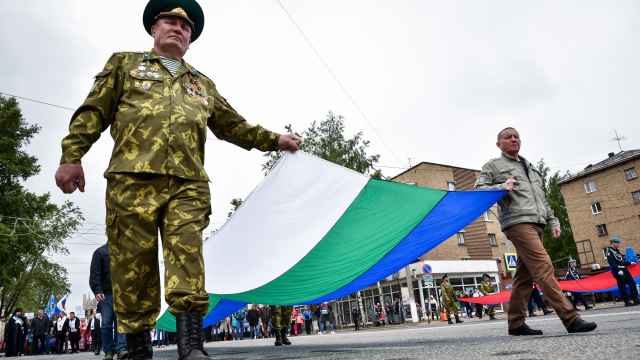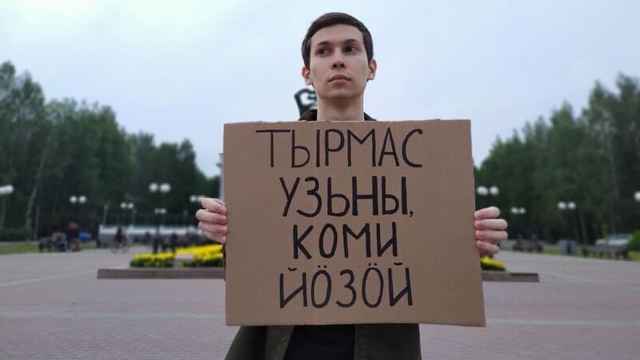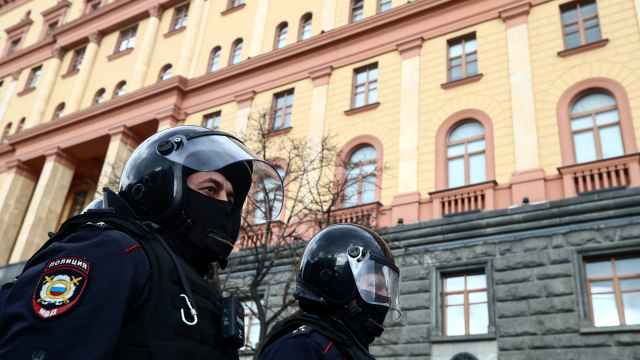Lana Pylaeva was born and raised in Russia’s northwestern republic of Komi in a family of Komi, a Finno-Ugric ethnic group indigenous to the region.
A scientist by training, Pylaeva had been living and working in Europe for several years when Russia’s full-scale invasion of Ukraine prompted her to enter political activism.
Pylaeva — who self-describes herself as “Komi from Komi” — now heads Komi Daily, the republic’s flagship independent news outlet which was one of the first two news outlets to be designated as “terrorist” by Russia in November.
The Moscow Times met with Pylaeva in the Dutch city of Utrecht where she now lives to speak about her multifaceted activism, the future of Komi Daily and her take on the decolonization of Russia.
MT: You are a trained scientist. How did you become an activist?
LP: Yes, I have a Ph.D. in theoretical chemistry, I worked at a university and held two postdoc positions, but when protests broke out in Belarus [in 2020] I joined solidarity rallies here [in the Netherlands].
The [Russian] diaspora movement began to take shape here soon after that, especially amid protests in support of Alexei Navalny following his return [to Russia from Germany] where he was treated for poisoning with chemical weapons. Navalny’s poisoning, of course, was particularly shocking to me as a scientist…
I was getting involved in the diaspora movement more and more, especially with the start of the full-scale invasion of Ukraine. It was clear to me that this was an imperial war, a war against Ukrainian identity. Ukrainians are fighting for the right to be Ukrainian, for the right not to be Russian, for the right to speak their own language. I’m Komi, so I easily relate to this [struggle].
This is how my activism began, but right now I am on the path of learning again. Though this time I am studying everything related to decoloniality and the rights of Indigenous peoples — that’s what I want to pursue and try to do something good for my people and my native republic.
You were a member of Free Russia NL and Feminist Anti-War Resistance, and now you also head the independent news outlet Komi Daily. Could you tell me a bit more about the projects you are currently working on?
I began [my activist work] with Free Russia NL, a [Russian] diaspora organization in the Netherlands, which was formed in the wake of the 2021 protests in support of Navalny. It grew rapidly with the start of the full-scale invasion of Ukraine and continues its work, but I left the board in 2023.
The topic of Komi has always been dear to me. … In June 2022, when I was still with Free Russia NL, we held a rally under the slogan ‘Peoples of Russia Against the War.’ The rally was my idea. For it, we collected anti-war messages like ‘No to war’ or ‘Stop the war’ in the languages of the Indigenous peoples of Russia and I also made a speech in the Komi language.
Everything unfolded quite naturally, and at some point, my work with Komi Daily became my main focus.
I also joined Feminist Anti-War Resistance (FAR) in 2022 because feminist optics resonate with me. I am still an active member of FAR’s local chapter in Utrecht, where we organize events in support of political prisoners, protests and other initiatives. We recently raised donations to help homeless animals in Ukraine, particularly in Odesa.
We spoke with Valera Ilinov, the founder of Komi Daily, less than a year ago when he still headed the publication, so I just have to ask how was the torch of leadership transferred to you.
Well, this is already a public matter.
There was a conflict between Valera and [Komi Daily journalist] Tanya Chuprova because she hadn’t been paid her salary for quite a long time. I don’t have Twitter [now X], so I didn’t see Tanya’s original post [about the situation], but I heard about it…in a small Komi community chat that I am a member of.
When Valera announced that he was shutting down Komi Daily, I told Tanya, ‘Let’s take this project over — he’s shutting it down anyway — and we can run it together. We’ll decide how to manage it and shape it as we see fit.’
When I suggested this to Valera, he just sent over all the passwords and access credentials [to me]. That was pretty much it.
Komi Daily was labeled ‘terrorist’ in Russia, yet you decided to keep the project running despite all the risks. What motivated this decision?
What motivates me is my love for Komi. I believe it's incredibly important to talk about Komi identity. It’s also crucial to highlight the problems that the region is facing, the environmental issues as well as social challenges.
And honestly, why the hell should I care about what some FSB officer thinks I should or shouldn't be doing? I don’t believe that talking about Komi identity is terrorism in any way. Russia is a multiethnic country, and the Komi language is the second official language of the republic of Komi.
Yes, we were labeled [terrorist], but it's clear that even if we shut down this organization and start a new one, it's only a matter of time before we end up on that list again. This is just how repressions and the crackdown on freedom of speech in Russia work.
You have mentioned that you are studying things related to decoloniality. I think we use this word so often now, but what does it mean for you in the context of Russia?
First and foremost, it’s about equality: equal [use of] the Russian language and the Komi language, equal distribution of resources between Moscow and [Komi’s capital] Syktyvkar.
Another key issue is Indigenous rights, the right of Indigenous peoples to manage their own land and resources and be able to decide what happens on their land themselves.
I don’t particularly care whether Komi remains part of the [Russian] Federation or becomes an independent state. What matters to me is that life in Komi is good and that we can speak the Komi language and be Komi.
I don’t even know how to explain what it means to be Komi. … Different peoples have their own way of life and way of thinking shaped over centuries or even millennia. For Komi, this [revolves around] the land, the forests and the sustainable use of natural resources. I believe…our [traditional] way of life should be what defines the region.
For me, decolonization also means identifying and dismantling hierarchies. Even today, when people say ‘Why learn Komi? We all speak Russian anyway’ — that is a hierarchy at work.
The liberal Russian opposition often refers to its dream of the ‘beautiful Russia of the future.’ Do you share that dream? Do you think Indigenous people have a place in it?
I believe that it is necessary to engage with the liberal opposition and communicate our perspective to them, which is what I try to do. I attend forums, meetings and conferences. I talk to people and explain the importance of including Indigenous perspectives.
The mainstream liberal opposition is still very Moscow-centric. Their approach is essentially ‘everything stays the same, just without Putin.’ But that is not what I want, because this approach won’t change anything in Komi. That alone will not make my republic free. It will not allow the people in Komi to live well, develop their human potential, take care of the environment, preserve their identity, or grow in any meaningful way.
In Russia’s hyper-centralized system, people are used to ignoring the regions. Everyone still seems to believe that all problems can be solved in Moscow. But if we look at the numbers, fewer people live in Moscow and St. Petersburg combined than in the rest of Russia. We carry more weight. The fact that we are more spread out does not make us any less important. I think the Russian opposition still doesn’t understand this.
I don’t know how effective this [strategy] will be or how long it will take to have these conversations, but we won’t be able to move forward without having them.
Once the war ends, once Putin is gone, we will have to negotiate. We will have to fight for our rights in whatever political landscape emerges. And in that scenario, the current representatives of the liberal opposition may not be the worst people we will have to deal with.
A Message from The Moscow Times:
Dear readers,
We are facing unprecedented challenges. Russia's Prosecutor General's Office has designated The Moscow Times as an "undesirable" organization, criminalizing our work and putting our staff at risk of prosecution. This follows our earlier unjust labeling as a "foreign agent."
These actions are direct attempts to silence independent journalism in Russia. The authorities claim our work "discredits the decisions of the Russian leadership." We see things differently: we strive to provide accurate, unbiased reporting on Russia.
We, the journalists of The Moscow Times, refuse to be silenced. But to continue our work, we need your help.
Your support, no matter how small, makes a world of difference. If you can, please support us monthly starting from just $2. It's quick to set up, and every contribution makes a significant impact.
By supporting The Moscow Times, you're defending open, independent journalism in the face of repression. Thank you for standing with us.
Remind me later.







